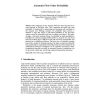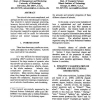3408 search results - page 87 / 682 » Logic, language, information and computation |
CORR
2004
Springer
13 years 8 months ago
2004
Springer
Many functional logic languages are based on narrowing, a unification-based goal-solving mechanism which subsumes the reduction mechanism of functional languages and the resolutio...
SEMWEB
2009
Springer
14 years 3 months ago
2009
Springer
Most languages for the Semantic Web have their logical basis in some fragment of first-order logic. Thus, integrating first-order logic with probability is fundamental for represen...
COLING
1992
13 years 10 months ago
1992
The adverb is the most complicated, and perhaps also the most interesting part of speech. Past research in natural language processing, however, has not dealt seriously with adver...
CSDA
2006
13 years 9 months ago
2006
Uncertainty is an attribute of information. The path-breaking work of Shannon has led to a universal acceptance of the thesis that information is statistical in nature. Concomitan...
PODS
2010
ACM
13 years 10 months ago
2010
ACM
We study highly expressive query languages such as datalog, fixpoint, and while-languages on probabilistic databases. We generalize these languages such that computation steps (e....


